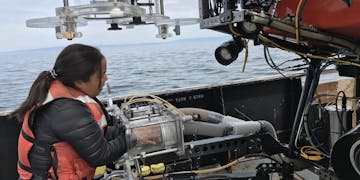The David and Lucile Packard Foundation has long had a strong focus on protecting marine resources for future generations. To that end, the foundation sponsors MBARI’s mission to spur ocean exploration and discovery, and its longstanding commitment to support the outreach and education programs of the Monterey Bay Aquarium (MBA). The two institutions are now embarking on a joint venture to identify new opportunities to foster science-based policies for ocean conservation. Dubbed the Aquarium-MBARI Incubator Initiative, or AMI2, this effort provides the programmatic focus and the administrative framework to leverage the unique capabilities of each organization in synergy to accomplish that goal.
The AMI2 is an entrepreneurial venture for developing joint MBA-MBARI research projects by pooling resources to assess potential collaborations and prototype project feasibility. The AMI2 is not intended to be a permanent administrative home for joint research programs. Rather, the AMI2 is where pilot programs either fail fast and end, or graduate to become stand-alone research programs at the aquarium or MBARI—or both.
The aquarium’s Ocean Memory Lab is central to the AMI2 venture. This lab is designed to address a significant problem in marine conservation: the general lack of long-term ecological records. Such records are critical for setting baselines for and tracking changes in ocean health. These data can be used to better inform ocean management practices.
The Ocean Memory Lab aims to uncover the cryptic ecosystem and genetic records that lie within preserved tissues of marine life. Embedded within kelp fronds, seabird feathers, sea otter teeth, tuna bones, shark vertebrae, sea turtle shells, and whale earwax—to name just a few—are time-stamped measurements documenting migration routes, birthing records, age and growth, commercial fishing impacts, ocean temperatures, pollutants, nutrients, ocean pH, and much more. These tissues contain vast undiscovered datasets that hold promise for understanding how our oceans are changing and fueling new science discoveries.
Over the past year, the AMI2 team has turned its attention to themes that center on ocean sampling and observations as a natural pairing of the research strengths of both organizations. On the aquarium side, there is an emerging focus on developing century-scale ecological records that may be used to monitor and evaluate ocean health. MBARI can tap its established research infrastructure around developing autonomous sensor and sampling systems to observe marine systems. In 2018, the AMI2 will pair the historically focused sampling approach with new technologies as a way to assess ocean conditions of today. These research efforts will initially be centered on microplastics and environmental DNA (eDNA). The former involves the prevalence, fate, and impact of microplastic contaminants on marine food webs, while the latter explores new approaches for assessing population dynamics of fish in the salmon family and invasive species in local coastal streams.
